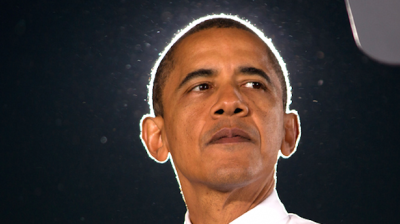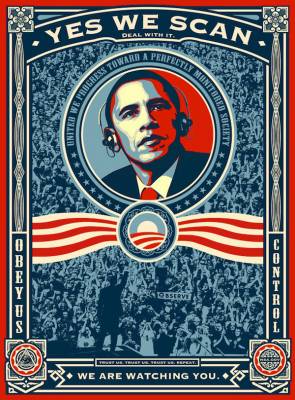 “Ex-Hoffnungsträger trifft Nachfolger” (Ex-beacon of hope meets successor) was the headline at Spiegel Online when Obama visited the Pope earlier this week. A pretty neat summary of how Obama is viewed nowadays in Europe. Where comes this change from?
“Ex-Hoffnungsträger trifft Nachfolger” (Ex-beacon of hope meets successor) was the headline at Spiegel Online when Obama visited the Pope earlier this week. A pretty neat summary of how Obama is viewed nowadays in Europe. Where comes this change from?
When Obama visited Europe during his first campaign for presidency it was hysteria all over – as if the most popular boy band would visit. People were euphoric as they a lot of hope in Obama. Many Europeans yearned for change in American politics. Feed up by the division the war on terror had caused it was hoped that Obama will bring change to the better. A lot of belief was put in Obama: hope for a fresh start, new policies and U.S. that would be less divided and less internally focussed. His promises gave hope that he would bridge the gap in American politics and the gap between the U.S. and its allies – and that he would break with policies in foreign affair and civil rights that discredited America. There was hope that he could make America again a role model and beacon for a free society.
This time there had been no cheering, welcome was rather indifferent. Many people are disillusioned. Too little has changed since he started in office, too many promises have not been realised yet or even been broken. Ok, the expectations were too high at the beginning – but the result so far is rather meagre. The only big change realised is Obama-care, a project that is highly controversial in the U.S. but widely seen as sensible and overdue move in Europe.
The three most often cited hopes when Obama started were reducing the division in America, changing the course in foreign politics (e.g. reducing troops and finding better alignment with allies) and the hope of more focus on civil rights. How has he done on those three?
On the first, the division in America, the perception is that American politics is now even more divided. Of course, this is mostly to be blamed on the Tea Party. But a divided Congress is rather common and to get things done every president has to find ways to bring parties together and to find allies for his plans. Obama ignored the opposition to long and neglected the conflict or even acted outright partisan. In Europe it is very common that a compromise between parties has to be found as most countries are run by a coalition government. Not having found ways to get parts of his election agenda realised is seen as a failure of Obama.
On the second issue Obama had a good start: he reduced troops in Iraq and handed the country over to the elected government. Also for Afghanistan he announced the pull-out of the troops. Hopeful is also that he negotiates with Iran, deescalating the situation. But the record on this issue is mixed at best. He intensified the use of drones to unknown levels. Not only that he continues with that to ignore the primate of law and continues the policy of playing for own justice – the use of drones is also often decided outside the view of Congress and with that placed outside democratic control.
 But the biggest let-down is the third area – civil rights. It was hoped that with Obama the U.S. would change course and become again leading in civil rights. But the only positive here is that with Obama being president the cause of equal rights for black people has been helped. On other issues – as e.g. gay right – he only acted after court rulings or there is no improvement at all. E.g. Guantanamo, where closure had been explicitly promised during his first campaign, is still open and prisoners there are kept outside the legal system. The handling of the NSA affair caused also a lot of raised eyebrows. And that is not only due to the extent of spying and the missing sensibility when it comes to allies. An even bigger concern is the lack of democratic control and the culture at NSA – and that Obama lacked any sense of urgency to tackle this. Another prominent issue is how Obama deals with whistleblowers. Whistleblowers are vital for a functioning democracy. How Obama reacted to WikiLeaks revelations of State Department communication by Julian Assange and Manning and later to the NSA revelations by Edward Snowden has not contributed to the international standing of the U.S. Over the last years a lot of credit has been lost – adding to what had already been lost under Bush jr.
But the biggest let-down is the third area – civil rights. It was hoped that with Obama the U.S. would change course and become again leading in civil rights. But the only positive here is that with Obama being president the cause of equal rights for black people has been helped. On other issues – as e.g. gay right – he only acted after court rulings or there is no improvement at all. E.g. Guantanamo, where closure had been explicitly promised during his first campaign, is still open and prisoners there are kept outside the legal system. The handling of the NSA affair caused also a lot of raised eyebrows. And that is not only due to the extent of spying and the missing sensibility when it comes to allies. An even bigger concern is the lack of democratic control and the culture at NSA – and that Obama lacked any sense of urgency to tackle this. Another prominent issue is how Obama deals with whistleblowers. Whistleblowers are vital for a functioning democracy. How Obama reacted to WikiLeaks revelations of State Department communication by Julian Assange and Manning and later to the NSA revelations by Edward Snowden has not contributed to the international standing of the U.S. Over the last years a lot of credit has been lost – adding to what had already been lost under Bush jr.
This all makes the U.S. a less credible defender of the primacy of law and of civil rights in other countries, to the contrary of the hopes many Europeans had when Obama started. And as could be seen e.g. around Crimea this just makes it easier for autocrats to find justifying arguments for their own actions. Maybe the next president of the U.S. can bring the change Europe hopes for?
(This is a blog version of my earlier article at CDN on this)